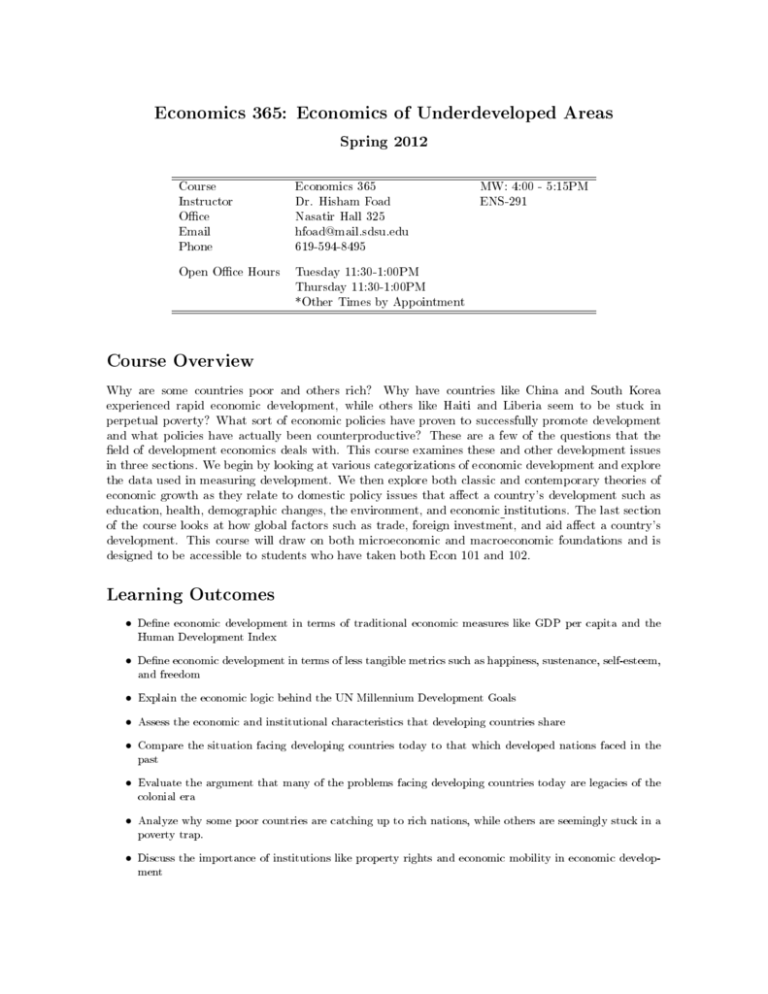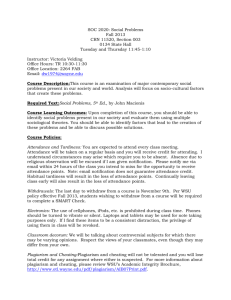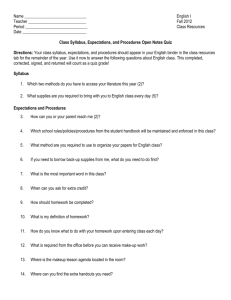
Economics 365: Economics of Underdeveloped Areas
Spring 2012
Course
Instructor
Oce
Email
Phone
Economics 365
Dr. Hisham Foad
Nasatir Hall 325
hfoad@mail.sdsu.edu
619-594-8495
Open Oce Hours
Tuesday 11:30-1:00PM
Thursday 11:30-1:00PM
*Other Times by Appointment
MW: 4:00 - 5:15PM
ENS-291
Course Overview
Why are some countries poor and others rich? Why have countries like China and South Korea
experienced rapid economic development, while others like Haiti and Liberia seem to be stuck in
perpetual poverty? What sort of economic policies have proven to successfully promote development
and what policies have actually been counterproductive? These are a few of the questions that the
eld of development economics deals with. This course examines these and other development issues
in three sections. We begin by looking at various categorizations of economic development and explore
the data used in measuring development. We then explore both classic and contemporary theories of
economic growth as they relate to domestic policy issues that aect a country's development such as
education, health, demographic changes, the environment, and economic institutions. The last section
of the course looks at how global factors such as trade, foreign investment, and aid aect a country's
development. This course will draw on both microeconomic and macroeconomic foundations and is
designed to be accessible to students who have taken both Econ 101 and 102.
Learning Outcomes
•
Dene economic development in terms of traditional economic measures like GDP per capita and the
Human Development Index
•
Dene economic development in terms of less tangible metrics such as happiness, sustenance, self-esteem,
and freedom
•
Explain the economic logic behind the UN Millennium Development Goals
•
Assess the economic and institutional characteristics that developing countries share
•
Compare the situation facing developing countries today to that which developed nations faced in the
past
•
Evaluate the argument that many of the problems facing developing countries today are legacies of the
colonial era
•
Analyze why some poor countries are catching up to rich nations, while others are seemingly stuck in a
poverty trap.
•
Discuss the importance of institutions like property rights and economic mobility in economic development
Econ 365, Spring 2012: Syllabus
•
Page 2
Calculate various measures of income inequality and poverty like the Gini coecient and the Total
Poverty Gap
•
Explain why countries with the least equitable income distributions tend to be poorer and less developed
•
Evaluate classical theories of economic growth in terms of their conclusions and ability to explain observed
phenomena
•
Contrast classical growth theories with modern theories of growth
•
Assess the impact of high fertility and population growth rates on economic development
•
Analyze population growth policy
•
Identify the impacts of labor migration on developing countries
•
Dene remittances and explain their impacts on development
•
Articulate an argument for why child labor and gender discrimination limit economic development
•
Explain why the informal sector tends to be larger in developing countries and the consequences of
having a large informal sector.
•
Explain why human capital matters for economic development
•
Formulate policies to promote the accumulation of human capital
•
Contrast dierent ways to measure health across countries
•
Discuss the impact of HIV/AIDS on development in Sub-Saharan Africa
•
Describe the environmental challenges posed by economic development
•
Forecast the eects of climate change in the developing world
•
Evaluate various development policies in terms of their environmental sustainability
•
Identify the economic logic behind the Washington Consensus and evaluate how these recommendations
have worked in practice
•
Explain how civil society can play an important role in economic development
•
Judge whether increased international trade has been benecial to developing countries or not.
•
Compare the development policies of export promotion and import substitution
•
Assess how global trade policy may be reformed to promote global development
•
Calculate the balance of payments for a country and identify the conditions that may lead to a balance
of payments crisis
•
Evaluate the actions of the International Monetary Fund during balance of payments crises
•
Analyze the arguments for nancial market reform in developing countries
•
Compare the impacts of foreign direct investment and foreign portfolio investment on development
•
Analyze the eectiveness of foreign aid on development
•
Discuss how Randomized Control Trials can be used to evaluate development policies and discuss their
limitations
•
Compare traditional top-down aid to micronance
•
Evaluate the reasons why foreign aid has sometimes had negative outcomes on development
Econ 365, Spring 2012: Syllabus
Page 3
Readings
The main textbook for this course will be Economic Development by Michael Todaro and Stephen
Smith, 11th Edition, Pearson Addison-Wesley Publishers (ISBN 0-321-48573-4). Course lectures will
be structured on the chapters in the textbook, though specic details may diverge. Lectures will be
based on the 11th edition of the book, but you could conceivably get by with the 10th edition. I
caution you that if you do choose this option, you need to have good class attendance to ll in the
gaps between the 10th and 11th editions of the book.
Exams
There will be three closed-book exams. Each exam is self-contained (i.e. not cumulative), covering
only the material discussed in class up to that point. Though the third exam will take place during
nals week, it will only cover material discussed after the second exam. The exams are tentatively
scheduled for the following dates:
Exam I
Exam II
Exam III
February 22nd
April 9th
May 14th (3:30-5:30)
There will be no make-up exams oered. If you know that you will miss an exam, let me know
as soon as possible. Students who notify me BEFORE the exam with a valid excuse can add the
weight of a missed exam to the other exams. Students who notify me after an exam or without a valid
excuse will receive a zero on any exam that they miss. Valid excuses include school-sponsored functions
such as athletic events or performances, unavoidable and documented work conicts, or health issue
accompanied by a doctor's note. Let me know as soon as possible if you know that you will be unable
to sit for an exam.
Quizzes
We will have an announced quiz in class once per week covering the material discussed up to that
point (i.e. you will only be quizzed on material you've already seen). The quizzes will be short (10
minutes) and provide you with an incentive to keep up with the material. I will drop your lowest quiz
score when computing your quiz average. As with exams, there will be no make-up quizzes oered. If
you know you will be absent on the day of a quiz and have a valid excuse, let me know beforehand
and I can grant you an excused absence from the quiz. Any notication after the quiz will result in a
zero for that quiz.
Grading
Grading for the course will consist of the following weights:
Quiz Average
Exam Average
25%
75%
For example, a student who earned an 87 average on quizzes and a 78 average on exams would
have a nal average computed as:
87*0.25 + 78*0.75 = 21.75 + 58.5 = 80.25 (B-)
Econ 365, Spring 2012: Syllabus
Page 4
I employ a standard grading scale in which 80-82 is a B-, 83-86 is a B, 87-89 is a B+ and so forth.
In determining a grade distribution, I aim for an average score across the class of 78 and a standard
deviation of 10 points. If the average or standard deviation diers greatly from these targets on any
one assignment, then I will utilize a curve.
Attendance
While attendance is not mandatory, it is highly recommended. Past experiences indicate that there is
a strong and positive correlation between attendance and exam scores. The lectures will cover material
not in the textbook, and you can save yourself a lot of time and frustration by showing up and paying
attention in class. Furthermore, you will miss out on the weekly quiz if you skip class. I encourage
you to ask questions and participate in class discussions. While I am happy to lecture for the full class
period, you may nd this format less appealing. Engaging in discussions and asking questions will not
only liven up the class, but also help you comprehend economics as more than just graphs and numbers.
Blackboard
This course has a dedicated site on Blackboard to which I will regularly post lecture notes, homework
assignments, articles, and make announcements. It is your responsibility to regularly check Blackboard.
You may also use it as a discussion forum outside of class and oce hours. Please let me know as soon
as possible if you have any trouble accessing the site.
Academic Integrity
I consider academic dishonesty to be a serious oense, and follow a zero tolerance policy in this regard.
You can do very well in this course if you are willing to put in the work, and any benet you may
perceive from cheating is far outweighed by the penalty not only to your academic performance, but
your personal integrity as well. I also ask that you be courteous to your fellow classmates and the
class itself. Please arrive to class promptly and turn o your cell phones. Refrain from talking when
your classmates or I have the oor. If you have a question or a point to make, raise your hand and I
will call on you. I will not tolerate rudeness toward your classmates and anyone guilty of this will be
asked to leave that class period.
If you need to leave class early, please let me know beforehand. I reserve the right to lower your
grade if you are consistently showing up late to class or leaving early. In the past, I have had a problem with students showing up to class on the day of a quiz and leaving as soon as they have taken the
quiz. Feedback from students in these courses has indicated that this practice has been a distraction
to their learning. I ask that if you must leave class after a quiz, please sit by the door and leave as
quietly as possible so as to not disturb your classmates. Finally, please read the SDSU Standards for
Student Conduct: http://csrr.sdsu.edu/conduct1.html
Accommodating Disabilities
If you have or acquire any sort of disability that may require accommodation, feel free to discuss it
with me at your convenience. If you want to nd out what services are available on campus, contact
Student Disability Services, Suite 3100, Calpulli Center, (619) 594-6473.
Econ 365, Spring 2012: Syllabus
Tentative Course Outline
Page 5
*** Subject to Change***
Part I: Dening and Measuring Economic Development
1. Introduction
a. Why study development?
b. Cross-Country dierences in development
c. What's the best way to measure "Well Being?"
d. The Millenium Development Goals
2. Measuring Development
a. Income as a development metric
b. The Human Development Index
c. Characteristics of developing countries
d. Historical dierences in development paths
e. Case Study in divergent development: Bangladesh and Pakistan
3. Inequality and Poverty
a. Measuring inequality
b. Measuring poverty
c. Characteristics of poverty groups
d. Should we care about inequality and poverty?
e. Policies targeting inequality and poverty
Chapter 1
Chapter 2
Chapter 5
Part II: Domestic Development Policy
4. Classical Growth Theory
a. The Solow Growth Model
b. International Dependence models
c. Endogeneous Growth Theory
d. Growth theory in context: Argentina and South Korea
5. Contemporary Growth Theory
a. Coordination failures and the "Big Push"
b. The Hausmann-Rodrik-Velasco growth diagnostic framwork
c. Case Study: China
6. Population Growth
a. Demographic trends
b. Economic models of fertility
c. Population growth policies
7. Education
a. Education systems in developing countries
b. Child labor
c. Education inequality across gender and income groups
Chapter 3
Chapter 4
Chapter 6
Chapter 8
Econ 365, Spring 2012: Syllabus
Page 6
Tentative Course Outline Continued...
8. Health
a. Measuring health in developing countries
b. HIV/AIDS
c. Malaria and other tropical diseases
d. Health and productivity
9. The Environment and Development
a. Measuring the scope and scale of environmental degradation
b. Common propery resources, public goods, and externalities
c. The impact of climate change on developing countries
d. Environmental policy options in developing and in developed countries
Part III: International Development Issues
10. International Trade and Development
a. Trends in globalization
b. Trade theory
c. Developing country experiences with trade
d. Export promotion vs. import substitution
11. The Balance of Payments and Debt Crises
a. Measuring global balances
b. Global debt and balance of payments crises
c. The IMF and its Stabilization programs
12. Foreign Sources of Finance
a. Foreign Direct Investment
b. Foreign Portfolio Investment
c. Remittances
d. Aid
13. Financial Markets and Government Policy
a. Financial market eciency in developing countries
b. International constraints on domestic policy
c. The role of international nancial institutions
d. Micronance
e. Financial market reforms for developing countries
Chapter 8
Chapter 10
Chapter 12
Chapter 13
Chapter 14
Chapter 15
Econ 365, Spring 2012: Syllabus
Page 7
Important Dates
January 31st
February 2nd
February 22nd
March 26th-30th
April 9th
May 9th
May 14th
Last day to drop classes (11:59PM deadline)
Last day to add classes and to apply for December 2011 graduation
Exam I
Spring Break
Exam II
Last day of class
Exam III (3:30-5:30PM)
Useful Links
wps.aw.com/aw_todarosmit_econdevelp_11/
Companion website to the textbook. Useful reference material as well as online quizzes for each chapter
infodome.sdsu.edu
SDSU Library. Good starting point to track down development information.
http://www.cgdev.org
Center for Global Development. Non-partisan think tank with a wealth of information on a variety of development topics. I highly recommend that you check this out.
hdr.undp.org
UN Human Development Report. Good information on development including the HDI and its components.
worldbank.org
Another excellent resource for accessing development statistics (particularly the World Development Indica-
tors ). Also check out the Policy Research Working Papers to see the leading edge of development research.
pwt.econ.upenn.edu/php_site/pwt_index.php
Penn World Tables. Good source of macroeconomic data that is comparable across countries and time.
devecondata.blogspot.com
Blog that tracks development data, some interesting nds.
www.gapminder.org
Really interesting site that shows dynamic graphs relating key development variables
http://www.google.com/publicdata
Similar to the site above, but with more data for you to play around with
www.imf.org/fandd
Finance and Development - an online journal on development published by the IMF. Interesting and accessible
articles.
www.povertyactionlab.org
Conducts eld experiments in development economics, very interesting stu.
kiva.org
Micronance website that connects lenders and borrowers.






